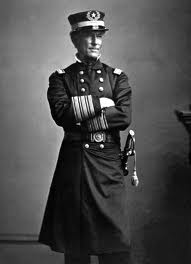
David Farragut is famous today for an order he gave during the Battle of Mobile Bay during the Civil War: “Damn the torpedoes, full speed ahead!” But Admiral Farragut can, and I believe, should, be remembered for so much more. He was one of the greatest American naval commanders in history and he was a youngster who didn’t let others “despise him because of his youth”.
David was born in Tennessee in 1801 to George and Elizabeth Farragut. Farragut’s father was a ferry captain and had fought in the Revolutionary War. He was also of Spanish decent. When he was young, David’s mother died and he was sent to live with his father’s friend David Porter so that he would be better taken care of. Porter was a US naval captain and Farragut’s adoptive brothers would also become his friends in later years, both William Porter and David Dixon Porter. Farragut and the Porter brothers would fight together in the Civil War.
Influenced by Porter, Farragut joined the Navy as a midshipman in 1810–at the age of nine. He fought in the War of 1812. He served under David Porter aboard the USS Essex. Farragut became a prize master during this time, meaning that he would be responsible for certain captured British ships. He was only twelve when he was left in command of the British whaler Barclay. The former captain, a man named Randall, threatened to shoot the young Farragut. Farragut retorted, “If you come onto this deck with pistols, I’ll have you thrown overboard!” Randall backed down.
After the War of 1812, Farragut served in the Caribbean “mosquito fleet”. Then he would go on to lead the Union Navy during the Civil War. His greatest achievement during that conflict was the capture of New Orleans. He also led the Union fleet to victory at Fort Jackson, Fort Phillip, Port Hudson and Mobile Bay. It was during the Battle of Mobile Bay, Alabama that he uttered his now famous phrase, “Damn the torpedoes! Full speed ahead!”
David Farragut was the first American full admiral and he was somewhat of a father figure to the American navy. David Farragut is remembered for a saying uttered in the heat of battle but he needs to be remembered for his own character and his personal courage.
